经典安徒生童话:最难使人相信的事情
简短的安徒生童话
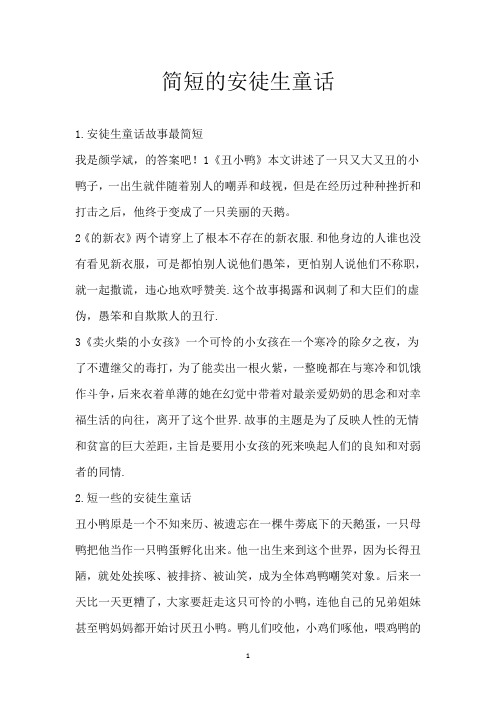
简短的安徒生童话1.安徒生童话故事最简短我是颜学斌,的答案吧!1《丑小鸭》本文讲述了一只又大又丑的小鸭子,一出生就伴随着别人的嘲弄和歧视,但是在经历过种种挫折和打击之后,他终于变成了一只美丽的天鹅。
2《的新衣》两个请穿上了根本不存在的新衣服.和他身边的人谁也没有看见新衣服,可是都怕别人说他们愚笨,更怕别人说他们不称职,就一起撒谎,违心地欢呼赞美.这个故事揭露和讽刺了和大臣们的虚伪,愚笨和自欺欺人的丑行.3《卖火柴的小女孩》一个可怜的小女孩在一个寒冷的除夕之夜,为了不遭继父的毒打,为了能卖出一根火紫,一整晚都在与寒冷和饥饿作斗争,后来衣着单薄的她在幻觉中带着对最亲爱奶奶的思念和对幸福生活的向往,离开了这个世界.故事的主题是为了反映人性的无情和贫富的巨大差距,主旨是要用小女孩的死来唤起人们的良知和对弱者的同情.2.短一些的安徒生童话丑小鸭原是一个不知来历、被遗忘在一棵牛蒡底下的天鹅蛋,一只母鸭把他当作一只鸭蛋孵化出来。
他一出生来到这个世界,因为长得丑陋,就处处挨啄、被排挤、被讪笑,成为全体鸡鸭嘲笑对象。
后来一天比一天更糟了,大家要赶走这只可怜的小鸭,连他自己的兄弟姐妹甚至鸭妈妈都开始讨厌丑小鸭。
鸭儿们咬他,小鸡们啄他,喂鸡鸭的那个女佣人踢他。
终于他忍受不了这样的日子,离开了养鸡场。
可是外面的世界也并没有让丑小鸭感到快乐。
他又一次被野鸭嘲笑,被老母鸡、雄猫为难,被女主人用火钳夹,还险些被猎人用枪打死,差点儿被野狗吃掉,忍饥挨饿,这些都成为丑小鸭幼年时候的一部分生活经历。
丑小鸭面对苦难,并没有绝望,也没有沉沦,而是始终不屈地奋斗,这一切缘于他心中拥有一份崇高的理想。
就是这种理想使他克服种种困难,最终变成了一只美丽、高贵的白天鹅.3.【安徒生童话有哪些短一点的不要太熟悉的急】冰姑娘在很久很久以前,冰山上有一个冰姑娘,他就是冰川女王,邪恶而残忍,冰姑娘只要吻了谁,谁就得死去.有一次,一个母亲背着一个一岁的小男孩,到冰山去采冰,结果被冰姑娘抓走了,当大伙去营救的时候,那位母亲已经躺在冰堆里死去了,可那位叫鲁迪的一岁小男孩却奇迹般地活了下来,冰姑娘派出他的晕眩精灵想把男孩抓回来,鲁迪住在祖父家中,和猫成了朋友,猫教他爬树,他竟比猫爬得还高,晕眩精灵抓不到他.后来,他叔叔教他射箭.鲁迪成了射手,可叔叔却在一次雪崩中死去了.鲁迪喜欢磨坊主的女儿,可磨坊主要求他捉一只鹰才能把女儿嫁给他.鲁迪用本领和计谋捉了一只鹰回来,终于能和心爱的人在一起.而冰姑娘并没有放弃对他的追捕,可他现在已经能爬得比太阳还高,冰姑娘对他也无可奈何.安徒生童话目录打火匣皇帝的新装飞箱丑小鸭没有画的画册跳高者红鞋衬衫领子一个豆英里的五粒豆一个贵族和他的女儿们守塔人奥列蝴蝶贝脱、比脱和比尔烂布片织补针拇指姑娘跳蚤和教授区别一本不说话的书夏日痴笔和墨水壶风车瓦尔都窗前的一起甲虫幸福的家庭最后的一天完全是真的蓟的遭遇新世纪的女神各得其所一星期的日子钱猪在辽远的海极荷马墓上的一朵玫瑰野天鹅母亲的故事犹太女子牙痛姑妈金黄的宝贝民歌的鸟儿接骨木树妈妈沙丘的故事第二卷小克劳斯和大克劳斯迁居的日子鬼火进城了幸运的套鞋鹳鸟枞树香肠栓熬的汤牧羊女和扫烟囱的人亚麻天上落下来的一片叶子恶毒的王子演木偶戏的人舞吧,舞吧,我的玩偶安妮·莉斯贝素琪藏着并不等于遗忘谁是最幸运的钟声顽皮的孩子识字课本老约翰妮讲的故事老墓碑姑妈墓里的孩子老路灯老头子做事总不会错老房子天鹅的窠创造冰姑娘小鬼和小商人阳光的故事依卜和小克丽斯玎梦神老上帝还没有灭亡园丁和他的贵族主人书法家茶壶小小的绿东西一点成绩天国花园最难使人相信的事情一枚银毫第三卷肉肠签子汤光棍汉的睡帽做出点样子来老橡树的最后一梦字母读本沼泽王的女儿跑得飞快的东西钟渊狠毒的王子多伊和他的女儿们踩面包的姑娘守塔人奥勒安妮·莉丝贝特孩子话一串珍珠墨水笔和墨水瓶墓中的孩子家养公鸡和风信公鸡真可爱沙冈那边的一段故事演木偶戏的人两兄弟教堂古钟搭邮车来的十二位屎壳郎老爹做的事总是对的雪人在鸭场里新世纪的缪斯冰姑娘蝴蝶普赛克蜗牛和玫瑰树害人鬼进城了风磨银毫子伯尔厄隆的主教和他的亲眷在幼儿室里金宝贝狂风吹跑了招牌茶壶民歌的鸟绿色的小东西小精灵和太太贝得、彼得和皮尔隐存着并不就是被忘却看门人的儿子搬迁日谎报夏姨妈癞蛤蟆教父的画册碎布块汶岛和格棱岛谁最幸福树精看鸡人格瑞得的一家蓟的经历你能琢磨出什么好运气可能在一根签子里彗星一个星期的每一天阳光的故事曾祖父烛最难令人相信的事一家人都怎样说跳吧,舞吧,我的小宝宝大海蟒园丁和主人跳蚤和教授老约翰妮讲了些什么大门钥匙跛脚的孩子牙痛姨妈。
安徒生童话《贝脱,比脱和比尔》
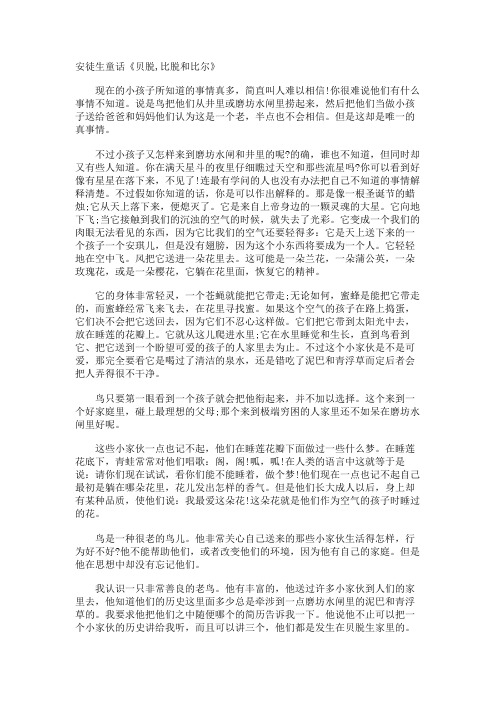
安徒生童话《贝脱,比脱和比尔》现在的小孩子所知道的事情真多,简直叫人难以相信!你很难说他们有什么事情不知道。
说是鸟把他们从井里或磨坊水闸里捞起来,然后把他们当做小孩子送给爸爸和妈妈他们认为这是一个老,半点也不会相信。
但是这却是唯一的真事情。
不过小孩子又怎样来到磨坊水闸和井里的呢?的确,谁也不知道,但同时却又有些人知道。
你在满天星斗的夜里仔细瞧过天空和那些流星吗?你可以看到好像有星星在落下来,不见了!连最有学问的人也没有办法把自己不知道的事情解释清楚。
不过假如你知道的话,你是可以作出解释的。
那是像一根圣诞节的蜡烛;它从天上落下来,便熄灭了。
它是来自上帝身边的一颗灵魂的大星。
它向地下飞;当它接触到我们的沉浊的空气的时候,就失去了光彩。
它变成一个我们的肉眼无法看见的东西,因为它比我们的空气还要轻得多:它是天上送下来的一个孩子一个安琪儿,但是没有翅膀,因为这个小东西将要成为一个人。
它轻轻地在空中飞。
风把它送进一朵花里去。
这可能是一朵兰花,一朵蒲公英,一朵玫瑰花,或是一朵樱花,它躺在花里面,恢复它的精神。
它的身体非常轻灵,一个苍蝇就能把它带走;无论如何,蜜蜂是能把它带走的,而蜜蜂经常飞来飞去,在花里寻找蜜。
如果这个空气的孩子在路上捣蛋,它们决不会把它送回去,因为它们不忍心这样做。
它们把它带到太阳光中去,放在睡莲的花瓣上。
它就从这儿爬进水里;它在水里睡觉和生长,直到鸟看到它、把它送到一个盼望可爱的孩子的人家里去为止。
不过这个小家伙是不是可爱,那完全要看它是喝过了清洁的泉水,还是错吃了泥巴和青浮草而定后者会把人弄得很不干净。
鸟只要第一眼看到一个孩子就会把他衔起来,并不加以选择。
这个来到一个好家庭里,碰上最理想的父母;那个来到极端穷困的人家里还不如呆在磨坊水闸里好呢。
这些小家伙一点也记不起,他们在睡莲花瓣下面做过一些什么梦。
在睡莲花底下,青蛙常常对他们唱歌:阁,阁!呱,呱!在人类的语言中这就等于是说:请你们现在试试,看你们能不能睡着,做个梦!他们现在一点也记不起自己最初是躺在哪朵花里,花儿发出怎样的香气。
安徒生童话故事汇总【三篇】
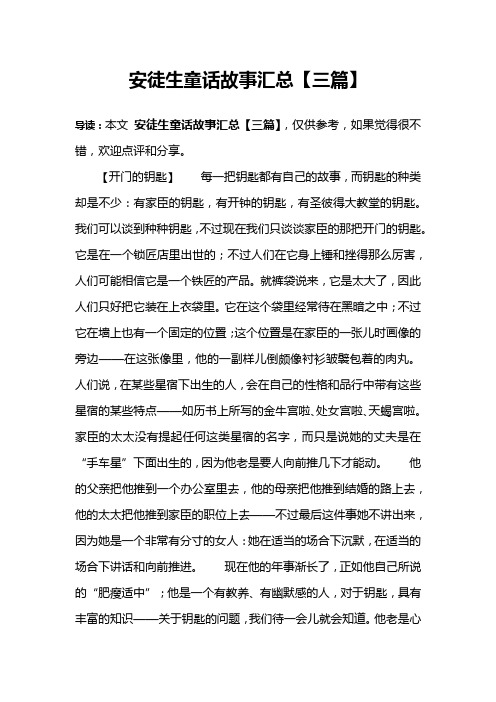
安徒生童话故事汇总【三篇】导读:本文安徒生童话故事汇总【三篇】,仅供参考,如果觉得很不错,欢迎点评和分享。
【开门的钥匙】每一把钥匙都有自己的故事,而钥匙的种类却是不少:有家臣的钥匙,有开钟的钥匙,有圣彼得大教堂的钥匙。
我们可以谈到种种钥匙,不过现在我们只谈谈家臣的那把开门的钥匙。
它是在一个锁匠店里出世的;不过人们在它身上锤和挫得那么厉害,人们可能相信它是一个铁匠的产品。
就裤袋说来,它是太大了,因此人们只好把它装在上衣袋里。
它在这个袋里经常待在黑暗之中;不过它在墙上也有一个固定的位置;这个位置是在家臣的一张儿时画像的旁边——在这张像里,他的一副样儿倒颇像衬衫皱襞包着的肉丸。
人们说,在某些星宿下出生的人,会在自己的性格和品行中带有这些星宿的某些特点——如历书上所写的金牛宫啦、处女宫啦、天蝎宫啦。
家臣的太太没有提起任何这类星宿的名字,而只是说她的丈夫是在“手车星”下面出生的,因为他老是要人向前推几下才能动。
他的父亲把他推到一个办公室里去,他的母亲把他推到结婚的路上去,他的太太把他推到家臣的职位上去——不过最后这件事她不讲出来,因为她是一个非常有分寸的女人:她在适当的场合下沉默,在适当的场合下讲话和向前推进。
现在他的年事渐长了,正如他自己所说的“肥瘦适中”;他是一个有教养、有幽默感的人,对于钥匙,具有丰富的知识——关于钥匙的问题,我们待一会儿就会知道。
他老是心情愉快;大家都喜欢他,愿意和他谈话。
他上城里去的时候,要不是他的妈妈在后面推着,是很难把他弄回家里来的。
他必然会跟他碰到的每一个熟人谈一通,而他的熟人却是多如过江之鲫。
这弄得他总是把吃饭的时间耽误了。
家臣太太坐在窗口盼望他。
“现在他来了!”她对女佣人说,“快把锅放上!……现在他又停下来了,跟一个什么人在谈话,快把锅拿下来吧,不然菜就煮得太烂了!……现在他来了!是的,把锅再放上吧!”不过他还是没有来。
他可以站在窗子下面对她点头,但是只要有一个熟人走过,他就控制不住自己;要跟这人说一两句话。
安徒生童话最难使人相信的事情:现实与幻想的交织

安徒生童话最难使人相信的事情:现实与幻想的交织安徒生,这位丹麦的文学巨匠,以其独特的笔触和深邃的想象力为我们描绘了一个又一个令人难以忘怀的童话世界。
从《打火匣》到《丑小鸭》,他的每一部作品都仿佛拥有一种魔力,吸引着我们去探索、去思考。
然而,在这些充满奇幻色彩的故事中,也有一些情节和细节,让我们在惊叹之余,也不禁产生了一些疑问和困惑。
这些“最难使人相信的事情”究竟是什么呢?它们又给我们带来了怎样的启示和感悟呢?首先,让我们来看看安徒生的童话世界中的一些“超自然”元素。
在《海的女儿》中,小人鱼为了爱情不惜付出一切,包括她美妙的嗓音和三百年的生命。
这种为了爱情而牺牲的精神固然令人感动,但小人鱼最终化为海上的泡沫这一结局,却让人难以接受。
在现实生活中,我们很难想象有人会为了爱情而做出如此巨大的牺牲。
这种超越常人的情感和行为,让我们不禁对安徒生的想象力感到惊叹。
再来看《野天鹅》中的情节。
艾丽莎为了救她的十一位哥哥,忍受了种种磨难和痛苦,最终成功解除了他们身上的魔法。
这个故事中的兄妹情深和坚韧不拔的精神令人感动,但艾丽莎所承受的痛苦和折磨却让人难以置信。
在现实生活中,我们很难想象有人会为了家人的幸福而承受如此巨大的痛苦。
这种超越常人的坚韧和牺牲精神,让我们对安徒生的创作能力感到敬佩。
除了这些“超自然”元素之外,安徒生童话中的一些社会现象也让我们感到难以置信。
在《卖火柴的小女孩》中,一个贫穷的小女孩在寒冷的冬夜中卖火柴求生,最终却冻死在街头。
这个故事中的社会不公和贫富差距令人心痛,让我们对现实生活中的种种问题产生了深刻的反思。
我们很难想象在一个文明的社会中,竟然还有如此悲惨的事情发生。
这种对现实生活的深刻揭示和批判精神,让我们对安徒生的社会责任感感到钦佩。
总的来说,安徒生童话中的这些“最难使人相信的事情”既体现了他的丰富想象力和创作能力,也反映了他对现实生活的深刻思考和批判精神。
这些故事让我们在欣赏奇幻情节的同时,也不禁对现实生活中的种种问题产生了深刻的反思。
带拼音的儿童故事-最难使人相信的事情(安徒生童话故事)
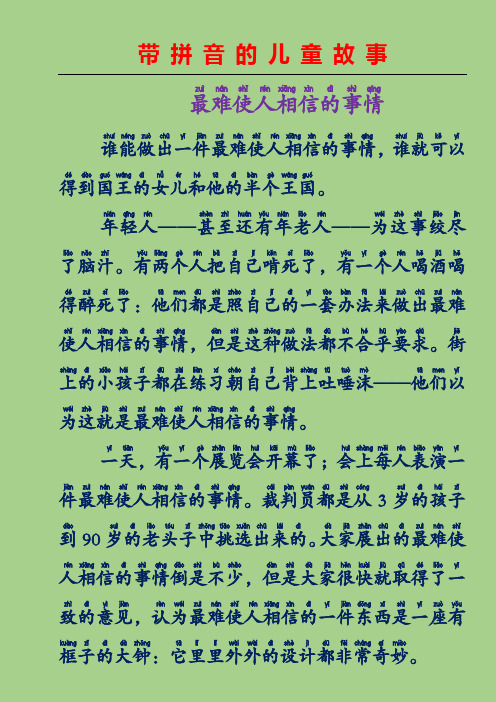
最难使人相信的事情谁能做出一件最难使人相信的事情,谁就可以得到国王的女儿和他的半个王国。
年轻人——甚至还有年老人——为这事绞尽了脑汁。
有两个人把自己啃死了,有一个人喝酒喝得醉死了:他们都是照自己的一套办法来做出最难使人相信的事情,但是这种做法都不合乎要求。
街上的小孩子都在练习朝自己背上吐唾沫——他们以为这就是最难使人相信的事情。
一天,有一个展览会开幕了;会上每人表演一件最难使人相信的事情。
裁判员都是从3岁的孩子到90岁的老头子中挑选出来的。
大家展出的最难使人相信的事情倒是不少,但是大家很快就取得了一致的意见,认为最难使人相信的一件东西是一座有框子的大钟:它里里外外的设计都非常奇妙。
它每敲一次就有活动的人形跳出来指明时刻。
这样的表演一共有12次,每次都出现了能说能唱的活动人形。
“这是最难使人相信的事情!”人们说。
钟敲一下,摩西就站在山上,在石板上写下第一道圣谕:“真正的上帝只有一个。
”钟敲两下,伊甸园就出现了:亚当和夏娃两人在这儿会面,他们都非常幸福,虽然他们两人连一个衣柜都没有——他们也没有这个必要。
钟敲三下,东方就出现了三王①他们之中有一位黑得像炭,但是他也没有办法,因为太阳把他晒黑了。
他们带来薰香和贵重的物品。
①“东方三王”,或称“东方三博士”。
据《圣经·新约全书·马太福音》第二章载,耶稣降生时,有几个博士“看见他的星”,从东方来到耶路撒冷,向他参拜。
后人根据所献礼物是三件,推定是三个博士。
钟敲四下,四季就出现了。
春天带来一只杜鹃,它栖在一根含苞的山毛榉枝上。
夏天带来蚱蜢,它栖在一根熟了的麦秆上。
秋天带来鹳鸟的一个空窠——鹳鸟都已经飞走了。
冬天带来一只老乌鸦,它栖在火炉的一旁,讲着故事和旧时的回忆。
“五官”在钟敲五下的时候出现:视觉成了一个眼镜制造匠;听觉成了一个铜匠;嗅觉在卖紫罗兰和车叶草;味觉是一个厨子;感觉是一个承办丧事的人,他戴的黑纱一直拖到脚跟。
钟敲了六下。
一个赌徒坐着掷骰子:最大的那一面朝上,上面是六点。
三年级安徒生童话故事5篇

三年级安徒生童话故事5篇充满神奇幻想的安徒生童话,为孩子构建着一座座美丽的水晶宫,里面有美丽善良的人鱼公主、四处流浪的丑小鸭、上当受骗的皇帝……阅读这些生动的故事,能让孩子在故事中受到启迪和感染。
下面为大家精心整理了一些关于三年级安徒生童话故事,欢迎查阅。
三年级安徒生童话故事1从前有一个恶毒而傲慢的王子,他的全部野心是想要征服世界上所有的国家,使人一听到他的名字就害怕。
他带着火和剑出征;他的兵士践踏着田野里的麦子,放火焚烧农民的房屋。
鲜红的火焰燎着树上的叶子,把果子烧毁,挂在焦黑的树枝上。
许多可怜的母亲,抱着赤裸的、仍然在吃奶的孩子藏到那些冒着烟的墙后面去。
兵士搜寻着她们。
如果找到了她们和孩子,那么他们的恶作剧就开始了。
恶魔都做不出像他们那样坏的事情,但是这位王子却认为他们的行为很好。
他的威力一天一天地增大;他的名字大家一提起来就害怕;他做什么事情都得到成功。
他从被征服了的城市中搜刮来许多金子和大量财富。
他在京城里积蓄的财富,比什么地方都多。
他下令建立起许多辉煌的宫殿、教堂和拱廊。
凡是见过这些华丽场面的人都说:“多么伟大的王子啊!”他们没有想到他在别的国家里造成的灾难,他们没有听到从那些烧毁了的城市的废墟中发出的呻吟和叹息声。
这位王子瞧瞧他的金子,瞧瞧他那些雄伟的建筑物,也不禁有与众人同样的想法:“多么伟大的王子啊!不过,我还要有更多、更多的东西!我不准世上有任何其他的威力赶上我,更不用说超过我!”于是他对所有的邻国掀起战争,并且征服了它们。
当他乘着车子在街道上走过的时候,他就把那些俘虏来的国王套上金链条,系在他的车上。
吃饭的时候,他强迫这些国王跪在他和他的朝臣们的脚下,同时从餐桌上扔下面包屑,要他们吃。
现在王子下令要把他的雕像竖在所有的广场上和宫殿里,甚至还想竖在教堂神龛面前呢。
不过祭司们说:“你的确威力不小,不过上帝的威力比你的要大得多。
我们不敢做这样的事情。
”“那么好吧,”恶毒的王子说,“我要征服上帝!”三年级安徒生童话故事2"多漂亮的玫瑰啊!"阳光说道。
安徒生童话精选:最难使人相信的事情
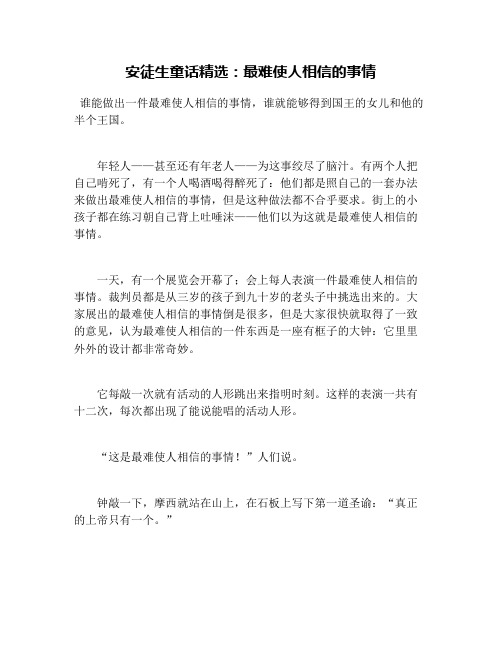
安徒生童话精选:最难使人相信的事情谁能做出一件最难使人相信的事情,谁就能够得到国王的女儿和他的半个王国。
年轻人——甚至还有年老人——为这事绞尽了脑汁。
有两个人把自己啃死了,有一个人喝酒喝得醉死了:他们都是照自己的一套办法来做出最难使人相信的事情,但是这种做法都不合乎要求。
街上的小孩子都在练习朝自己背上吐唾沫——他们以为这就是最难使人相信的事情。
一天,有一个展览会开幕了;会上每人表演一件最难使人相信的事情。
裁判员都是从三岁的孩子到九十岁的老头子中挑选出来的。
大家展出的最难使人相信的事情倒是很多,但是大家很快就取得了一致的意见,认为最难使人相信的一件东西是一座有框子的大钟:它里里外外的设计都非常奇妙。
它每敲一次就有活动的人形跳出来指明时刻。
这样的表演一共有十二次,每次都出现了能说能唱的活动人形。
“这是最难使人相信的事情!”人们说。
钟敲一下,摩西就站在山上,在石板上写下第一道圣谕:“真正的上帝只有一个。
”钟敲两下,伊甸园就出现了:亚当和夏娃两人在这儿会面,他们都非常幸福,虽然他们两人连一个衣柜都没有——他们也没有这个必要。
钟敲三下,东方就出现了三王①他们之中有一位黑得像炭,但是他也没有办法,因为太阳把他晒黑了。
他们带来薰香和贵重的物品。
①“东方三王”,或称“东方三博士”。
据《圣经·新约全书·马太福音》第二章载,耶稣降生时,有几个博士“看见他的星”,从东方来到耶路撒冷,向他参拜。
后人根据所献礼物是三件,推定是三个博士。
钟敲四下,四季就出现了。
春天带来一只杜鹃,它栖在一根含苞的山毛榉枝上。
夏天带来蚱蜢,它栖在一根熟了的麦秆上。
秋天带来鹳鸟的一个空窠——鹳鸟都已经飞走了。
冬天带来一只老乌鸦,它栖在火炉的一旁,讲着故事和旧时的回忆。
“五官”在钟敲五下的时候出现:视觉成了一个眼镜制造匠;听觉成了一个铜匠;嗅觉在卖紫罗兰和车叶草;味觉是一个厨子;感觉是一个承办丧事的人,他戴的黑纱一直拖到脚跟。
安徒生童话读书笔记(优秀15篇)

安徒生童话读书笔记(优秀15篇)安徒生童话读书笔记1《安徒生童话》有着独特的艺术风格:即诗意的美和喜剧性的幽默。
前者为主导风格,多体现在歌颂性的童话中,后者多体现在讽刺性的童话中。
这本书里,每一个故事都会给我带来启发,如:我读完《打火匣》这个故事,觉得它很精彩。
我特别喜欢故事里讲到的.那个神奇的打火匣和那三只具有神奇魔力的狗,现实生活中,虽然没有这种打火匣,但我相信,那三只勇敢、机智、忠诚的狗却是有的。
通过这个故事,还让我体会到了,面对任何困难,只要不放弃冷静面对,就会使自己找到好方法成功渡过难关。
喜欢童话倒并非因为留恋童年,迄今为止,我也只读过一套安徒生童话,出版时间很早,现在精装的绘有完美彩图的版本,我是看不进去的。
应该说,安徒生童话一直没有给过我优美的感觉,也许是因为那些繁体字的晦涩,或者是铅笔画插图的线条,又或者是仿宋体冷硬的字体,也许,是因为那些故事本身。
我从来也没有觉得安徒生童话是童话,那些故事中所包含的深沉的生活现实和婉转表达出的含义常常让我不寒而栗——也许不过是我自己想得太多了。
但不管怎样,读那些故事时的感觉,无论是带着梦幻的迷茫,还是抱着嫌恶的恐慌,总是难忘。
安徒生童话读书笔记2当我第一次读这本书的时候,我只觉故事写得很生动,很有趣;然而,今天当我把这本书再重温一遍的时候,我忽然发现《安徒生童话》中的每一个故事都包含着一个深刻的道理。
今天我就说说其中一篇看似普通的文章——《小锡兵》。
文章的大意是这样的:一个只有一只脚的小锡兵,被卖进了一个男孩家。
在这里,他爱上了另一个玩具—一个纸做的小姐。
但黑精灵让孩子们把锡兵放进纸船,推进了下水道。
锡兵在经历了重重困难后终于回到了家。
但黑精灵依旧不死心。
他把锡兵扔进了火炉,纸做的小姐也飞了进去。
最后,他们俩终于在一起了。
他虽然只有一条腿,但他却有着一颗勇敢的心,一颗充满爱的心,这无比的.重要。
这颗心不仅克服了重重困难,还弥补了他身体上的缺失。
经典安徒生童话:最难使人相信的事情

Whosoever could do the most incredible thing was to have the King's daughter and half of his kingdom. The young men, yes, and the old ones too, bent their heads, their muscles, and their hearts upon winning. To do what they thought was the most incredible thing, two ate themselves to death, and one died of overdrinking. Even the boys in the street practiced spitting on their own backs, which they supposed was the most incredible thing anyone could do. On a certain day there was to be an exhibition of things most incredible and everyone showed his best work. Judges were appointed, ranging from children of three to old men of ninety. It was a grand exposition of things out of the ordinary, but everybody promptly agreed that most incredible of all was a great hall clock - an extraordinary contraption, outside and in. When the clock struck, out came lifelike figures to tell the hour. There were twelve separate performances of these moving figures, with speaking and singing. People said that nothing so incredible had ever before been seen. The clock struck one, and there stood Moses on the mountain, writing in the tablets of the law the first great commandment: "There is only one true God." The clock struck two, and there were Adam and Eve, just as they first met in the Garden of Eden. Were ever two people so lucky! They didn't own so much as a clothes-closet, and they didn't need one. At the stroke of three the three Holy Kings appeared. One was as black as a coal, but he couldn't help that. The sun had blackened him. These kings brought incense and precious gifts. When the stroke of four sounded, the seasons advanced in their order. Spring carried a budding bough of beech, on which a cuckoo sang. Summer had for her sign a grasshopper on a ripening ear of wheat. Autumn had only an empty stork's nest, for the birds had flown away. Winter's tame crow perched on the corner of the stove, and told old tales of bygone days. At fiveo'clock there was a procession of the five senses. Sight was represented by a man who made spectacles. Hearing was a noisy coppersmith. Smell was a flower girl with violets for sale. Taste came dressed as a cook. Feeling was a mourner, with crape down to his heels. As the clock struck six, there sat a gambler, throwing dice for the highest cast of all, and they fell with the sixes up. Then came the seven days of the week, or they might be the seven deadly sins. People could not be sure which they were, for they were not easy to distinguish. Next came a choir of monks, to sing the eight o'clock evensong. At the stroke of nine, the nine muses appeared. One was an astronomer, one kept the books of history, and the others were connected with the theater. Ten o'clock struck, and Moses came forth again, this time with the tables in which were written all ten of God's commandments. When the clock struck again, boys and girls danced out. They played and sang this song: "All the way to heaven The clock struck eleven." And eleven it struck. Then came the stroke of twelve. Out marched the night watchman, wearing his cap and carrying his morning star - which is a truncheon tipped with spikes. He sang the old watch song: "'Twas at the midnight hour Our Savior He was born-" and as he sang the roses about him unfolded into the heads of angels, with rainbow-tinted wings. It was good to hear. It was charming to see. The whole thing was a work of extraordinary craftsmanship, and everyone agreed that it was the most incredible thing. The artist who had made it was young, generous, and sincere, a true friend, and a great help to his poor father and mother. He was altogether worthy of the Princess and of half the kingdom. On the day that they were to proclaim who had won, the whole town was bedecked and be-draped. The Princess sat on her throne. It had been newly stuffed with horsehair for the occasion, but it was still far from comfortable or pleasant. The judges winked knowingly at the man they had chosen, who stood there so happy and proud. His fortune was made, for had he not done the most incredible thing! "No!" a tall, bony, powerful fellow bawled out. "Leave it to me, I am the man to do the most incredible thing," and then he swung his ax at the craftsman's clock. Crack, crash, smash! There lay the whole thing. Here rolled the wheels, and there flew the hairsprings. It was wrecked and ruined. "I did that," said the lout. "My work beat his, and bowled you over, all in one stroke. I have done the most incredible thing." "To destroy such a work of art!" said the judges. "Why it's the most incredible thing we've ever seen." And the people said so too. So he was awarded the Princess and half the kingdom, because a law is a law, even if it happens to be a most incredible one. They blew trumpets from the ramparts and the city towers, and they announced, "The wedding will now take place." The Princess was not especially happy about it, but she looked pretty and she wore her most expensive clothes. The church was at its best by candle-light, late in the evening. The ladies of the court sang in processions, and escorted the bride. The lords sung, and accompanied the groom. From the way he strutted and swaggered along, you'd think that nothing could ever bowl him over. Then the singing stopped. It was so still that you could have heard a pin fall in the street. But it was not quiet for long. Crash! crash! the great church doors flew open, and boom! boom! all the works of the clock came marching down the church aisle and halted between the bride and the groom. Dead men cannot walk the earth. That's true, but a work of art does not die. Its shape may be shattered, but the spirit of art cannot be broken. The spirit of art jested, and that was no joke. . To all appearances it stood there as if it were whole, and had never been wrecked. The clock struck one hour right after another, from one to twelve, and all the figures poured forth. First Moses came, shining as if bright flames issued from his forehead. He cast the heavy stone tablets of the law at the bridegroom's feet, and tied them to the church floor. "I cannot lift them again," said Moses, "for you have broken my arms. Stand where you are!" Then came Adam and Eve, the three Wise Men of the East, and the four Seasons. Each told him the disagreeable truth. "Shame on you!" But he was not ashamed. All the figures of all the hours marched out of the clock, and they grew wondrous big. There was scarcely room for the living people. And at the stroke of twelve out strode the watchman, with his cap and his many-spiked morning star. There was a strange commotion. The watchman went straight to the bridegroom, and smote him on the forehead with his morning star. "Lie where you are," said the watchman. "A blow for a blow. We have taken out vengeance and the master's too, so now we will vanish." And vanish they did, every cogwheel and figure. But the candles of the church flared up like flowers of fire, and the gilded stars under the roof cast down long clear shafts of light, and the organ sounded though no man had touched it. The people all said that they had lived to see the most incredible thing. "Now," the Princess commanded, "summon the right man, the craftsman who made the work of art. He shall be my husband and my lord." He stood beside her in the church. All the people were in his train. Everyonewas happy for him, everyone blessed him, and there was no one who was envious. And that was the most incredible thing.。
一年级安徒生童话故事5篇_经典的童话故事

⼀年级安徒⽣童话故事5篇_经典的童话故事童话故事是指⼉童⽂学的⼀种体裁,童话中丰富的想象和夸张可以活跃你的思维;那⽣动的形象、美妙的故事可以帮你认识社会、理解⼈⽣,引导你做⼀个通达事理、明辨是⾮的⼈。
这次⼩编给⼤家整理了⼀年级安徒⽣童话故事,供⼤家阅读参考。
更多童话故事相关推荐↓↓↓⼀年级安徒⽣童话故事1很久以前,在⼤海深处住着神秘的⼈鱼家族。
海王有六个漂亮的⼥⼉,其中最⼩的那个最美丽,唱的歌最好听,跳的舞也最好看。
是⽼祖母的宝贝。
⼩⼈鱼⼗五岁⽣⽇的时候,他浮出⽔⾯看到了美丽的世界。
太阳刚刚落下,离她不远的海⾯上有⼀艘巨⼤的帆船。
她游到船舷边,从其中⼀个窗户往⾥看,那⾥⾯正在举⾏舞会呢!舞会的主⾓是⼀个漂亮的王⼦,今天正是他⼗六岁的⽣⽇。
⼩⼈鱼深深地被王⼦迷住了。
这时,海⾯刮起了狂风,⽔⼿们还没来得及收起风帆,船就被⼤风暴撕得粉碎。
她勇敢地向落⽔的王⼦游了过去,抱住已经奄奄⼀息的王⼦,带着他游到了岸边。
她吻了吻王⼦的脸颊,希望他能醒过来。
这时,有⼈向这边⾛来,⼩⼈鱼只好离开王⼦,躲到岩⽯后⾯。
⼀个年轻的姑娘发现了王⼦,这时,王⼦醒了,他朝那个姑娘露出了感激的微笑——他还以为她救了他呢!⼩⼈鱼看到这⼀切,伤⼼地回到了海底的宫殿。
⼩⼈鱼每天都闷闷不乐,终于忍不住把⼼⾥的秘密告诉了⼀个姐姐。
很快,所有的姐姐都知道了这件事情,其中⼀个姐姐知道那个王⼦住的宫殿在什么地⽅。
于是,姐姐们拉着⼩⼈鱼⼀起游向王⼦所在的那个海湾,⼩⼈鱼终于在⼀个华丽的宫殿⾥看到了王⼦,她终于⼜开始开⼼地笑了。
她常常来这⾥看王⼦,她越来越喜欢⼈类了,她热切地盼望着⾃⼰能够上岸去,与他们⽣活在⼀起。
于是她去问她的好祖母,⼈和⼈鱼有什么不同,⼈鱼怎么才能变成⼈?⽼祖母告诉她,⼈是有灵魂的,死后会升上天空,在天国⾥永存。
⽽⼈鱼没有灵魂,⼈鱼如果想获得灵魂的话,必须得有⼀个⼈类爱她胜过其他的⼀切,⽽且必须要结婚,他才可能把他的灵魂分⼀半给她。
安徒生童话:最难令人相信的事(英)
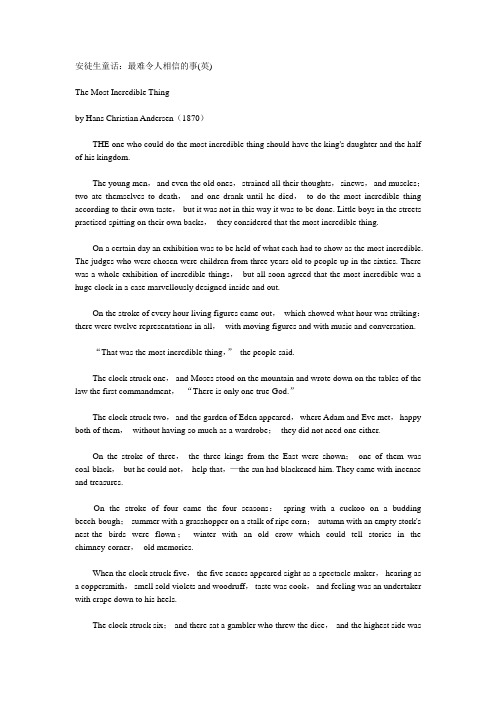
安徒生童话:最难令人相信的事(英)The Most Incredible Thingby Hans Christian Andersen(1870)THE one who could do the most incredible thing should have the king's daughter and the half of his kingdom.The young men,and even the old ones,strained all their thoughts,sinews,and muscles;two ate themselves to death,and one drank until he died,to do the most incredible thing according to their own taste,but it was not in this way it was to be done. Little boys in the streets practised spitting on their own backs,they considered that the most incredible thing.On a certain day an exhibition was to be held of what each had to show as the most incredible. The judges who were chosen were children from three years old to people up in the sixties. There was a whole exhibition of incredible things,but all soon agreed that the most incredible was a huge clock in a case marvellously designed inside and out.On the stroke of every hour living figures came out,which showed what hour was striking:there were twelve representations in all,with moving figures and with music and conversation.“That was the most incredible thing,”the people said.The clock struck one,and Moses stood on the mountain and wrote down on the tables of the law the first commandment,“There is only one true God.”The clock struck two,and the garden of Eden appeared,where Adam and Eve met,happy both of them,without having so much as a wardrobe;they did not need one either.On the stroke of three,the three kings from the East were shown;one of them was coal-black,but he could not,help that,—the sun had blackened him. They came with incense and treasures.On the stroke of four came the four seasons:spring with a cuckoo on a budding beech-bough;summer with a grasshopper on a stalk of ripe corn;autumn with an empty stork's nest-the birds were flown;winter with an old crow which could tell stories in the chimney-corner,old memories.When the clock struck five,the five senses appeared sight as a spectacle-maker,hearing as a coppersmith,smell sold violets and woodruff,taste was cook,and feeling was an undertaker with crape down to his heels.The clock struck six;and there sat a gambler who threw the dice,and the highest side wasturned up and showed six.Then came the seven days of the week,or the seven deadly sins,people were not certain which;they belonged to each other and were not easily distinguished.Then came a choir of monks and sang the eight o'clock service.On the stroke of nine came the nine muses;one was busy with astronomy;one with historical archives;the others belonged to the theatre.On the stroke of ten,Moses again came forward with the tables of the law,on which stood all God's commandments,and they were ten.The clock struck again;then little boys and girls danced and hopped about. They played a game,and sang,“Two and two and seven,the clock has struck eleven.”When twelve struck the watchman appeared with his fur cap and halberd:he sang the old watch verse:“Twas at the midnight hourOur Saviour He was born.“And while he sang,roses grew and changed into angel-beads borne on rainbow-coloured wings.It was charming to hear,and lovely to see. The whole was a matchless work of art—the most incredible thing,every one said.The designer of it was a young man,good-hearted and happy as a child,a true friend,and good to his old parents;he deserved the Princess and the half of the kingdom.The day of decision arrived;the whole of the town had a holiday,and the Princess sat on the throne,which had got new horse-hair,but which was not any more comfortable. The judges round about looked very knowingly at he one who was to win,and he stood glad and confident;his good fortune was certain,he had made the most incredible thing.“No,I shall do that now!”shouted just then a long bony fellow. “I am the man for the most incredible thing,”and he swung a great axe at the work of art.“Crash,crash!”and there lay the whole of it. Wheels and springs flew in all directions;everything was destroyed.“That I could do!”said the man. “My work has overcome his and overcome all of you. Ihave done the most incredible thing.”“To destroy such a work of art!”said the judges. “Yes,certainly that is the most incredible thing.”All the people said the same,and so he was to have the Princess and the half of the kingdom,for a promise is a promise,even if it is of the most incredible kind.It was announced with trumpet-blast from the ramparts and from all the towers that the marriage should be celebrated. The Princess was not quite pleased about it,but she looked charming and was gorgeously dressed. The church shone with candles;it shows best late in the evening. The noble maidens of the town sang and led the bride forward;the knights sang and accompanied the bridegroom. He strutted as if he could never be broken.Now the singing stopped and one could have heard a pin fall,but in the midst of the silence the great church door flew open with a crash and clatter,and boom!boom!the whole of the clock-work came marching up the passage and planted itself between the bride and bridegroom. Dead men cannot walk again,we know that very well,but a work of art can walk again;the body was knocked to pieces,but not the spirit;the spirit of the work walked,and that in deadly earnest.The work of art stood there precisely as if it were whole and untouched. The hours struck,the one after the other,up to twelve,and the figures swarmed forward;first Moses:flames of fire seemed to flash from his forehead;he threw the heavy stone tables down on the feet of the bridegroom and pinned them to the church floor.“I cannot lift them again,”said Moses,“you have knocked my arm off!Stand as you stand now!”Then came Adam and Eve,the wise men from the East,and the four Seasons;each of these told him unpleasant truths,and said “For shame!”But he was not in the least ashamed.All the figures which each stroke of the clock had to exhibit came out of it,and all increased to a terrible size;there seemed scarcely to he room for the real people;and when at the stroke of twelve the watchman appeared with his fur cap and halberd,there was a wonderful commotion;the watchman walked straight up to the bridegroom and struck him on the forehead with his halberd.“Lie there,”he said,“like for like!we are avenged and our master as well!we vanish!”And so the whole work disappeared;but the candles round about in the church became great bouquets,and the gilded stars on the ceiling of the church sent out long,clear beams,and theorgan played of itself. All the people said it was the most incredible thing they had ever experienced.“Will you then summon the right one!”said the Princess,“the one who made the work of art;let him be my lord and husband.”And he stood in the church with the whole of the people for his retinue. All were glad and all blessed him;there was not one who was jealous—and that was the most incredible thing of all.。
简短有趣的安徒生童话故事_有趣安徒生故事

简短有趣的安徒⽣童话故事_有趣安徒⽣故事安徒⽣童话故事是享誉全球的童话故事,所有的孩⼦都抵挡不住故事⾥的情节诱惑。
下⾯给⼤家带来⼀些关于简短有趣的安徒⽣童话故事,供⼤家参考。
安徒⽣童话故事1拇指姑娘从前有⼀个⼥⼈,她⾮常希望有⼀个丁点⼉⼩的孩⼦。
但是她不知道从什么地⽅可以得到。
因此她就去请教⼀位巫婆。
她对巫婆说:“我⾮常想要有⼀个⼩⼩的孩⼦!你能告诉我什么地⽅可以得到⼀个吗?”“嗨!这容易得很!”巫婆说。
“你把这颗⼤麦粒拿去吧。
它可不是乡下⼈的⽥⾥长的那种⼤麦粒,也不是鸡吃的那种⼤麦粒啦。
你把它埋在⼀个花盆⾥。
不久你就可以看到你所要看的东西了。
”“谢谢您,”⼥⼈说。
她给了巫婆三个银币。
于是她就回到家来,种下那颗⼤麦粒。
不久以后,⼀朵美丽的⼤红花就长出来了。
它看起来很像⼀朵郁⾦⾹,不过它的叶⼦紧紧地包在⼀起,好像仍旧是⼀个花苞似的。
“这是⼀朵很美的花,”⼥⼈说,同时在那美丽的、黄⽽带红的花瓣上吻了⼀下。
不过,当她正在吻的时候,花⼉忽然劈啪⼀声,开放了。
⼈们现在可以看出,这是⼀朵真正的郁⾦⾹。
但是在这朵花的正中央,在那根绿⾊的雌蕊上⾯,坐着⼀位娇⼩的姑娘,她看起来⼜⽩嫩,⼜可爱。
她还没有⼤拇指的⼀半长,因此⼈们就将她叫做拇指姑娘。
拇指姑娘的摇篮是⼀个光得发亮的漂亮胡桃壳,她的垫⼦是蓝⾊紫罗兰的花瓣,她的被⼦是玫瑰的花瓣。
这就是她晚上睡觉的地⽅。
但是⽩天她在桌⼦上玩耍——在这桌⼦上,那个⼥⼈放了⼀个盘⼦,上⾯⼜放了⼀圈花⼉,花的枝⼲浸在⽔⾥。
⽔上浮着⼀起很⼤的郁⾦⾹花瓣。
拇指姑娘可以坐在这花瓣上,⽤两根⽩马尾作桨,从盘⼦这⼀边划到那⼀边。
这样⼉真是美丽啦!她还能唱歌,⽽且唱得那么温柔和甜蜜,从前没有任何⼈听到过。
⼀天晚上,当她正在她漂亮的床上睡觉的时候,⼀个难看的癞蛤蟆从窗⼦外⾯跳进来了,因为窗⼦上有⼀块玻璃已经破了。
这癞蛤蟆⼜丑⼜⼤,⽽且是粘糊糊的。
她⼀直跳到桌⼦上。
拇指姑娘正睡在桌⼦上鲜红的玫瑰花瓣下⾯。
《安徒生童话》读后感

《安徒生童话》读后感《安徒生童话》读后感(精选20篇)当品读完一部作品后,你有什么总结呢?此时需要认真思考读后感如何写了哦。
那么如何写读后感才能更有感染力呢?下面是小编整理的《安徒生童话》读后感,欢迎阅读,希望大家能够喜欢。
《安徒生童话》读后感篇1寒假期间,我读了《安徒生童话》。
其中让我印象最为深刻的是《野天鹅》。
主人公艾丽莎在编制解救哥哥的衣服时遇到很大的困难:刺手的荨麻、恐怖的吸血鬼、大主教的诽谤,最让她感到痛楚的是为哥哥悲惨命运而生的焦灼。
但她勇往直前,不畏艰险,最终救出她的哥哥们,自己也获得了国王真正的爱。
艾丽莎的意志让他坚持了下来,印象最深的就是艾丽莎被大主教诽谤而没有说一个字----因为一旦说话,她的哥哥就会死掉。
为了她的哥哥,她忍受了那么多的痛苦和侮辱。
最终,她坚持下来了。
她的毅力非常值得我们去学习。
如果我是她的话,我一定会说出自己的苦衷,和国王过上幸福的生活。
记得以前做过很多事都放弃了,比如以前上的萨克斯课,最喜欢的画画……最难忘二年级时上武术班和最近上的奥数尖子班。
武术班就是枯燥了一点,痛了一点,哪里比得上艾丽莎忍受的痛苦?奥数班就是难了一点,繁琐一点,哪有织荨麻披甲难和繁琐?所以,只要坚持不懈,就一定可以成功。
《安徒生童话》读后感篇2前不久,我读了一本书,名叫《安徒生童话》。
相信大家都已经看过了,我也是。
但是每一次看都会使我受益匪浅,这一次,也不例外。
虽然我已经看过了,但还是看的津津有味,那一幅幅惊心动魄的画面,激动人心的时刻,恍如身临其境。
让人看到了就爱不释手!那么,让我来问问,童话在你们心中是什么样的呢?童话在我心中是圣洁的,是美丽的,更是无与伦比的!最令我震撼的是“丑小鸭”这个故事。
丑小鸭自从生下来,就被别人讨厌,森林里没有动物愿意跟它做朋友,也没有动物喜欢它,所以,它自打出生就被亲人嘲笑、遗弃了。
但是,它并没有从此落入绝望里,而是日后,虽然它遇到了许多困难,但是它在这些困难面前,从不退缩,他为了自己美好的未来,敢于去追求属于它自己的幸福生活。
安徒生童话故事经典_经典的童话故事有哪些
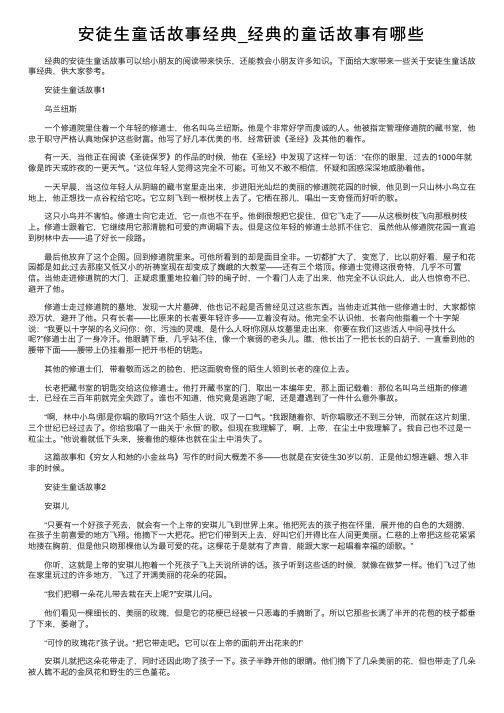
安徒⽣童话故事经典_经典的童话故事有哪些经典的安徒⽣童话故事可以给⼩朋友的阅读带来快乐,还能教会⼩朋友许多知识。
下⾯给⼤家带来⼀些关于安徒⽣童话故事经典,供⼤家参考。
安徒⽣童话故事1乌兰纽斯⼀个修道院⾥住着⼀个年轻的修道⼠,他名叫乌兰纽斯。
他是个⾮常好学⽽虔诚的⼈。
他被指定管理修道院的藏书室,他忠于职守严格认真地保护这些财富。
他写了好⼏本优美的书,经常研读《圣经》及其他的着作。
有⼀天,当他正在阅读《圣徒保罗》的作品的时候,他在《圣经》中发现了这样⼀句话:“在你的眼⾥,过去的1000年就像是昨天或昨夜的⼀更天⽓。
”这位年轻⼈觉得这完全不可能。
可他⼜不敢不相信,怀疑和困惑深深地威胁着他。
⼀天早晨,当这位年轻⼈从阴暗的藏书室⾥⾛出来,步进阳光灿烂的美丽的修道院花园的时候,他见到⼀只⼭林⼩鸟⽴在地上,他正想找⼀点⾕粒给它吃。
它⽴刻飞到⼀根树枝上去了。
它栖在那⼉,唱出⼀⽀奇怪⽽好听的歌。
这只⼩鸟并不害怕。
修道⼠向它⾛近,它⼀点也不在乎。
他倒很想把它捉住,但它飞⾛了——从这根树枝飞向那根树枝上。
修道⼠跟着它,它继续⽤它那清脆和可爱的声调唱下去。
但是这位年轻的修道⼠总抓不住它,虽然他从修道院花园⼀直追到树林中去——追了好长⼀段路。
最后他放弃了这个企图。
回到修道院⾥来。
可他所看到的却是⾯⽬全⾮。
⼀切都扩⼤了,变宽了,⽐以前好看,屋⼦和花园都是如此;过去那座⼜低⼜⼩的祈祷室现在却变成了巍峨的⼤教堂——还有三个塔顶。
修道⼠觉得这很奇特,⼏乎不可置信。
当他⾛进修道院的⼤门,正疑虑重重地拉着门铃的绳⼦时,⼀个看门⼈⾛了出来,他完全不认识此⼈,此⼈也惊奇不已,避开了他。
修道⼠⾛过修道院的墓地,发现⼀⼤⽚墓碑,他也记不起是否曾经见过这些东西。
当他⾛近其他⼀些修道⼠时,⼤家都惊恐万状,避开了他。
只有长者——⽐原来的长者要年轻许多——⽴着没有动。
他完全不认识他,长者向他指着⼀个⼗字架说:“我要以⼗字架的名义问你:你,污浊的灵魂,是什么⼈呀!你刚从坟墓⾥⾛出来,你要在我们这些活⼈中间寻找什么呢?”修道⼠出了⼀⾝冷汗。
短而有趣的安徒生童话故事_安徒生童话有哪些
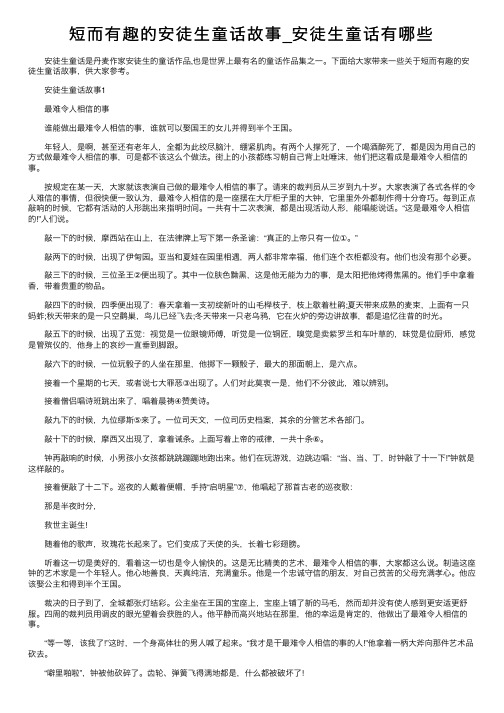
短⽽有趣的安徒⽣童话故事_安徒⽣童话有哪些安徒⽣童话是丹麦作家安徒⽣的童话作品,也是世界上最有名的童话作品集之⼀。
下⾯给⼤家带来⼀些关于短⽽有趣的安徒⽣童话故事,供⼤家参考。
安徒⽣童话故事1最难令⼈相信的事谁能做出最难令⼈相信的事,谁就可以娶国王的⼥⼉并得到半个王国。
年轻⼈,是啊,甚⾄还有⽼年⼈,全都为此绞尽脑汁,绷紧肌⾁。
有两个⼈撑死了,⼀个喝酒醉死了,都是因为⽤⾃⼰的⽅式做最难令⼈相信的事,可是都不该这么个做法。
街上的⼩孩都练习朝⾃⼰背上吐唾沫,他们把这看成是最难令⼈相信的事。
按规定在某⼀天,⼤家就该表演⾃⼰做的最难令⼈相信的事了。
请来的裁判员从三岁到九⼗岁。
⼤家表演了各式各样的令⼈难信的事情,但很快便⼀致认为,最难令⼈相信的是⼀座摆在⼤厅柜⼦⾥的⼤钟,它⾥⾥外外都制作得⼗分奇巧。
每到正点敲响的时候,它都有活动的⼈形跳出来指明时间。
⼀共有⼗⼆次表演,都是出现活动⼈形,能唱能说话。
“这是最难令⼈相信的!”⼈们说。
敲⼀下的时候,摩西站在⼭上,在法律牌上写下第⼀条圣谕:“真正的上帝只有⼀位①。
”敲两下的时候,出现了伊甸园。
亚当和夏娃在园⾥相遇,两⼈都⾮常幸福,他们连个⾐柜都没有。
他们也没有那个必要。
敲三下的时候,三位圣王②便出现了。
其中⼀位肤⾊黝⿊,这是他⽆能为⼒的事,是太阳把他烤得焦⿊的。
他们⼿中拿着⾹,带着贵重的物品。
敲四下的时候,四季便出现了:春天拿着⼀⽀初绽新叶的⼭⽑榉枝⼦,枝上歇着杜鹃;夏天带来成熟的麦束,上⾯有⼀只蚂蚱;秋天带来的是⼀只空鹳巢,鸟⼉已经飞去;冬天带来⼀只⽼乌鸦,它在⽕炉的旁边讲故事,都是追忆往昔的时光。
敲五下的时候,出现了五觉:视觉是⼀位眼镜师傅,听觉是⼀位铜匠,嗅觉是卖紫罗兰和车叶草的,味觉是位厨师,感觉是管殡仪的,他⾝上的哀纱⼀直垂到脚跟。
敲六下的时候,⼀位玩骰⼦的⼈坐在那⾥,他掷下⼀颗骰⼦,最⼤的那⾯朝上,是六点。
接着⼀个星期的七天,或者说七⼤罪恶③出现了。
⼈们对此莫衷⼀是,他们不分彼此,难以辨别。
《安徒生童话》读后感(15篇)

《安徒生童话》读后感(15篇)《安徒生童话》读后感1我读过许多的书,但我还是喜欢《安徒生童话》。
但我很快就被《卖火柴的小女孩》这篇文章迷住了:那是一个大雪纷飞的夜里,周围像死了人一般寂静,她衣服破烂披着一一头卷曲的、美丽的金色头发,争着一双乌黑发亮的眼睛。
她的脸和手都冻僵了,嘴里不断的喊着:“卖火柴了,卖火柴了……”然而,回答她的只是风的声音。
看到这里,我的心都凉透了。
这个世界是多么冷酷无情,就像这严酷的寒冬。
最后,这个饥寒交迫、又冷又饿、又无人疼爱的小女孩离开了人间!此时,我的眼睛湿润了,眼泪禁不住滚了下来。
“尧尧,快来吃午饭。
”在妈妈的催促声中,我放下书本,走到客厅,只见餐桌上摆满了丰盛的午饭。
若在平时我早就“大开胃口”了,可是今天却吃不下,心中想的全都是那可怜的小女孩。
尽管饭菜是那么鲜美,可我总觉得不是滋味,想想世界上还有许多穷孩子在饥寒交迫中生活,对比之下,我们的生活是多么幸福。
《安徒生童话》读后感2读完《安徒生童话》这本书让我最深刻的是《丑小鸭》的故事。
《丑小鸭》讲了鸭妈妈生了几只小鸭子,最后生的一只又大又丑,大家就叫它丑小鸭,它的兄弟姐妹和它的朋友都不喜欢它,大家都欺负它,只有妈妈疼爱它,但丑小鸭还是觉得自己很孤独。
有一天与鸭妈妈走丢的丑小鸭独自来到了森林,森林中没有遇到一个朋友,在寒冷的冬天它在森林受尽了折磨,想要飞走的它最终靠自己的努力飞上了天空,变成了一只美丽的白天鹅,所以丑小鸭是经过了重重努力才最终变成了天鹅。
通过这个故事,使我明白了一个道理,无论做什么事,只要用心去学去做就一定能成功。
以后我也要经过自己的努力去做好每一件事,做一个对国家对社会有用的人。
《安徒生童话》读后感3《安徒生童话》把小巧的拇指姑娘、美丽的小人鱼、聪明的小克劳斯和残忍的大克劳斯、坚定的锡兵、可爱的白雪公主和可怜的卖火柴的小女孩等人物刻画地栩栩如生。
最可笑的是爱穿新衣的愚蠢的国王,被两个骗子骗得失去了辨别能力,一丝不挂地在街上走,直到一个天真的小孩说出了真相……作者安徒生希望人间出现一个美丽幸福的世界,在这个世界里人们都具有高尚的品质和理想、勇敢和舍己救人的献身精神。
安徒生童话故事(15篇)

安徒生童话故事安徒生童话故事(15篇)一天我协助哈里发迈蒙处理一些国家大事后,便告辞回家。
走在途中,我想小便,看看四周没什么行人,便拐进一条小巷里撒尿。
我刚要回身继续往家里走,猛然间发现前面隐隐约约有一件东西悬在那里。
这情景引起了我的好奇心,我不由自主地走到近前一看,原来那是一个有四个把儿的大吊篮,篮中铺着锦缎制的垫子。
我顺着吊篮往上看,才知那是从一个敞开的大窗户里吊下来的。
我心里暗自琢磨:"这只大吊篮是不会平白无故从窗里吊到这里的,这其中必定是有缘故的。
"我越想越奇怪,这个大吊篮大得很,能容一个人躺在里面,我倒想试试,躺到里面会是个什么滋味?受到好奇心的驱使,我竟身不由己地爬进吊篮,嘿,躺在里面还真舒服!不料,我刚躺好,那吊篮就动了起来,我想跳出来,已经来不及了。
吊篮不停地往上升,一直升到窗口,几只手伸过来,一下子把吊篮弄到屋子里去了。
我在慌乱中抬头一看,只见四张美丽的脸蛋冲着我,连声喊着:"你好啊,欢迎你到我们这儿来做客!请下来吧。
"四个姑娘把我从吊篮中搀扶出来,我定睛一看,原来这儿是个客厅,里面的摆设十分考究,我坐在那里,恍忽是置身于哈里发的王宫之中。
我正在欣赏时,对面墙上挂着的帷幕慢慢地往上卷去,帷幕后面出现一群侍女,每个侍女的手中都拿着东西,有的举着明晃晃的蜡烛,有的提着焚烧着沉香的香炉。
在这群侍女的中间,是一个长得很美的女郎,在侍女们的簇拥下,那女郎迈着姗姗步伐朝我走来,笑容满面地对我说:"您大驾光临,使寒舍蓬荜生辉!快请坐吧!"待我坐定后,她便坐到我的身边,与我交谈起来。
她问我:"你是怎么到这儿来的?"我说:"我在回家的路上,折进这条巷子中来,见墙边吊着一只大篮子,觉得十分奇怪,便身不由己地爬进篮子里,不知不觉中被人吊到这里来了。
"女郎听了,微微一笑,说道:"你放心吧,你不会受责怪的,我倒希望你能因错得福,有个好的报应呢!请问,你是干什么的?"我随口说道:"我在巴格达做买卖为生。
小学生安徒生童话读后感(三篇)

小学生安徒生童话读后感安徒生童话是世界上最著名的童话之一,其中的故事深深地吸引了无数读者。
我读了小学生安徒生童话后,深感这些故事不仅仅是儿童的乐园,更是一本启迪智慧、培养情操的经典读物。
小学生安徒生童话的魅力在于它们寓教于乐的特点。
故事情节精彩有趣,通过各类善恶形象的争斗,让读者在情节中领悟到诸多道理。
比如,《小红帽》追求善良和聪明,提醒人们不要盲目相信陌生人;《白雪公主》弘扬美的力量,教给我们美丽无垠的人性是向往和努力的方向。
每篇故事都以顶天立地、涵盖广泛的爱、善、美的道德教育为中心,会给小学生带来健康成长的影响。
在这些故事中,安徒生还着力刻画了许多真实而鲜活的性格。
有的形象是善良、勇敢的,比如《拇指姑娘》中的拇指小姑娘勇敢地克服了各种困难;有的形象是善良、聪明的,比如《丑小鸭》中的丑小鸭通过自己的努力和智慧,最终找到了属于自己的归宿。
这些性格塑造很有启发性,能激发小学生追求美好品质的愿望。
小学生安徒生童话的文学性也是其吸引读者的重要因素。
安徒生在童话中运用了丰富多样的修辞手法与技巧,使得故事更加生动有趣。
比如,他通过描写细腻而有力的语言,令读者身临其境地感受故事情节;通过巧妙的对比、比喻,寓意美的表达更加深入人心。
这些文学特色使得安徒生童话超越了普通故事,成为了一种艺术的享受。
安徒生童话还给小学生带来了一种美的享受。
故事中与善恶斗争的形象、精美的插画以及优美的文字,都给读者带来了一种美的盛宴。
同时,故事本身体现了美的价值观,引领小学生追求真善美的道路。
美的力量是无穷的,每个孩子都应该向着追求美的方向努力。
读完小学生安徒生童话,我深感这些故事是孩子成长过程中很好的启蒙读物。
这些故事不仅仅是解放型的,更是一种愉悦和启迪。
我期待更多的小学生们去读这些童话,让这些故事成为树立正确的价值观和追求美好享受的指引。
小学生安徒生童话读后感(二)读后感格式版(____字):标题:《安徒生童话》读后感篇首:在读完《安徒生童话》这本书后,我深深地被其中的故事所吸引。
精典安徒生童话故事阅读
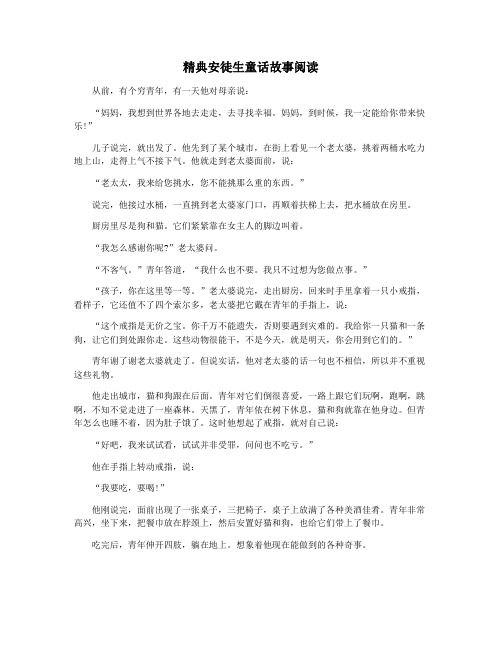
精典安徒生童话故事阅读从前,有个穷青年,有一天他对母亲说:“妈妈,我想到世界各地去走走,去寻找幸福。
妈妈,到时候,我一定能给你带来快乐!”儿子说完,就出发了。
他先到了某个城市,在街上看见一个老太婆,挑着两桶水吃力地上山,走得上气不接下气。
他就走到老太婆面前,说:“老太太,我来给您挑水,您不能挑那么重的东西。
”说完,他接过水桶,一直挑到老太婆家门口,再顺着扶梯上去,把水桶放在房里。
厨房里尽是狗和猫。
它们紧紧靠在女主人的脚边叫着。
“我怎么感谢你呢?”老太婆问。
“不客气。
”青年答道,“我什么也不要。
我只不过想为您做点事。
”“孩子,你在这里等一等。
”老太婆说完,走出厨房,回来时手里拿着一只小戒指,看样子,它还值不了四个索尔多,老太婆把它戴在青年的手指上,说:“这个戒指是无价之宝。
你千万不能遗失,否则要遇到灾难的。
我给你一只猫和一条狗,让它们到处跟你走。
这些动物很能干,不是今天,就是明天,你会用到它们的。
”青年谢了谢老太婆就走了。
但说实话,他对老太婆的话一句也不相信,所以并不重视这些礼物。
他走出城市,猫和狗跟在后面。
青年对它们倒很喜爱,一路上跟它们玩啊,跑啊,跳啊,不知不觉走进了一座森林。
天黑了,青年依在树下休息,猫和狗就靠在他身边。
但青年怎么也睡不着,因为肚子饿了。
这时他想起了戒指,就对自己说:“好吧,我来试试看,试试并非受罪,问问也不吃亏。
”他在手指上转动戒指,说:“我要吃,要喝!”他刚说完,面前出现了一张桌子,三把椅子,桌子上放满了各种美酒佳肴。
青年非常高兴,坐下来,把餐巾放在脖颈上,然后安置好猫和狗,也给它们带上了餐巾。
吃完后,青年伸开四肢,躺在地上。
想象着他现在能做到的各种奇事。
但最难的是:先做哪件事?他时而想要一大堆金子、银子,时而想要几匹马和马车,时而想要城堡、土地……但这青年马上意识到:再这样想下去,过不久就会发疯的!我多次听说过,有人交运时发疯。
今天就这样,明天再想吧。
这时他侧过身子,睡着了。
- 1、下载文档前请自行甄别文档内容的完整性,平台不提供额外的编辑、内容补充、找答案等附加服务。
- 2、"仅部分预览"的文档,不可在线预览部分如存在完整性等问题,可反馈申请退款(可完整预览的文档不适用该条件!)。
- 3、如文档侵犯您的权益,请联系客服反馈,我们会尽快为您处理(人工客服工作时间:9:00-18:30)。
经典安徒生童话:最难使人相信的事情Whosoever could do the most incredible thing was to have the King's daughter and half of his kingdom.The young men, yes, and the old ones too, bent their heads, their muscles, and their hearts upon winning. To do what they thought was the most incredible thing, two ate themselves to death, and one died of overdrinking. Even the boys in the street practiced spitting on their own backs, which they supposed was the most incredible thing anyone could do.On a certain day there was to be an exhibition of things most incredible and everyone showed his best work. Judges were appointed, ranging from children of three to old men of ninety. It was a grand exposition of things out of the ordinary, but everybody promptly agreed that most incredible of all was a great hall clock - an extraordinary contraption, outside and in.When the clock struck, out came lifelike figures to tell the hour. There were twelve separate performances of these moving figures, with speaking and singing. People said that nothing so incredible had ever before been seen.The clock struck one, and there stood Moses on the mountain, writing in the tablets of the law the first great commandment: "There is only one true God." The clock struck two, and there were Adam and Eve, just as they first met in the Garden of Eden. Were ever two people so lucky! Theydidn't own so much as a clothes-closet, and they didn't need one. At the stroke of three the three Holy Kings appeared.One was as black as a coal, but he couldn't help that. The sun had blackened him. These kings brought incense and precious gifts. When the stroke of four sounded, the seasons advanced in their order. Spring carried a budding bough of beech, on which a cuckoo sang. Summer had for her sign a grasshopper on a ripening ear of wheat. Autumn had only an empty stork's nest, for the birds had flown away. Winter's tame crow perched on the corner of the stove, and told old tales of bygone days. At five o'clock there was a procession of the five senses. Sight was represented by a man who made spectacles. Hearing was a noisy coppersmith. Smell was a flower girl with violets for sale. Taste came dressed as a cook. Feeling was a mourner, with crape down to his heels. As the clock struck six, there sat a gambler, throwing dice for the highest cast of all, and they fell with the sixes up. Then came the seven days of the week, or they might be the seven deadly sins. People could not be sure which they were, for they were not easy to distinguish. Next came a choir of monks, to sing the eight o'clock evensong. At the stroke of nine, the nine muses appeared. One was an astronomer, one kept the books of history, and the others were connected with the theater. Ten o'clock struck, and Moses came forth again, this time with the tables in which were written all ten of God's commandments. When the clock struck again, boys and girls danced out. They played and sang this song:"All the way to heavenThe clock struck eleven."And eleven it struck. Then came the stroke of twelve. Out marched the night watchman, wearing his cap and carrying hismorning star - which is a truncheon tipped with spikes. He sang the old watch song:"'Twas at the midnight hourOur Savior He was born-"and as he sang the roses about him unfolded into the heads of angels, with rainbow-tinted wings.It was good to hear. It was charming to see. The whole thing was a work of extraordinary craftsmanship, and everyone agreed that it was the most incredible thing. The artist who had made it was young, generous, and sincere, a true friend, and a great help to his poor father and mother. He was altogether worthy of the Princess and of half the kingdom.On the day that they were to proclaim who had won, the whole town was bedecked and be-draped. The Princess sat on her throne. It had been newly stuffed with horsehair for the occasion, but it was still far from comfortable or pleasant. The judges winked knowingly at the man they had chosen, who stood there so happy and proud. His fortune was made, for had he not done the most incredible thing!"No!" a tall, bony, powerful fellow bawled out. "Leave it to me, I am the man to do the most incredible thing," and then he swung his ax at the craftsman's clock. Crack, crash, smash! There lay the whole thing. Here rolled the wheels, and there flew the hairsprings. It was wrecked and ruined. "I did that," said the lout. "My work beat his, and bowled you over, all in one stroke. I have done the most incredible thing.""To destroy such a work of art!" said the judges. "Whyit's the most incredible thing we've ever seen." And the people said so too. So he was awarded the Princess and half the kingdom, because a law is a law, even if it happens to be a most incredible one.They blew trumpets from the ramparts and the city towers, and they announced, "The wedding will now take place." The Princess was not especially happy about it, but she looked pretty and she wore her most expensive clothes. The church was at its best by candle-light, late in the evening. The ladies of the court sang in processions, and escorted the bride. The lords sung, and accompanied the groom. From the way he strutted and swaggered along, you'd think that nothing could ever bowl him over.Then the singing stopped. It was so still that you could have heard a pin fall in the street. But it was not quiet for long. Crash! crash! the great church doors flew open, and boom! boom! all the works of the clock came marching down the church aisle and halted between the bride and the groom.Dead men cannot walk the earth. That's true, but a work of art does not die. Its shape may be shattered, but thespirit of art cannot be broken. The spirit of art jested, and that was no joke.. To all appearances it stood there as if it were whole, and had never been wrecked. The clock struck one hour right after another, from one to twelve, and all the figures poured forth. First Moses came, shining as if bright flames issued from his forehead. He cast the heavy stone tablets of the law at the bridegroom's feet, and tied them to the church floor."I cannot lift them again," said Moses, "for you have broken my arms. Stand where you are!"Then came Adam and Eve, the three Wise Men of the East, and the four Seasons. Each told him the disagreeable truth. "Shame on you!" But he was not ashamed.All the figures of all the hours marched out of the clock, and they grew wondrous big. There was scarcely room for the living people. And at the stroke of twelve out strode the watchman, with his cap and his many-spiked morning star.There was a strange commotion. The watchman went straight to the bridegroom, and smote him on the forehead with hismorning star."Lie where you are," said the watchman. "A blow for a blow. We have taken out vengeance and the master's too, sonow we will vanish."And vanish they did, every cogwheel and figure. But the candles of the church flared up like flowers of fire, and the gilded stars under the roof cast down long clear shafts of light, and the organ sounded though no man had touched it.The people all said that they had lived to see the most incredible thing."Now," the Princess commanded, "summon the right man, the craftsman who made the work of art. He shall be my husbandand my lord."He stood beside her in the church. All the people were in his train. Everyone was happy for him, everyone blessed him, and there was no one who was envious. And that was the most incredible thing.。
